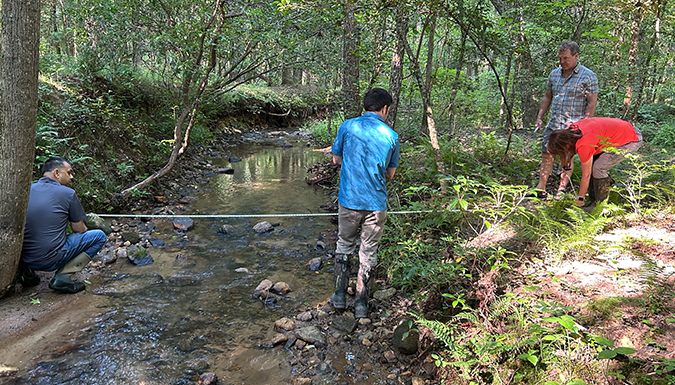Clemson researchers, professors, and Extension staff are working together to provide information, resources, and public programs that will improve the health of streams across South Carolina.
In 2018, the SC Department of Health and Environmental Control listed 710 streams as being impaired across the state. These impairments largely occur due to human interactions with the landscape and an increase in developed land. Mitigating these chemical, physical and biological impacts requires an understanding of how rivers and streams flow through our landscape and how we can best protect them using research-based methods.


Upcoming Workshops

River Course 101: Stream Morphology Assessment
October 27-29, 2025, Clemson University, Madren Conference Center
Currently, the River Course 101 (October 27–29, 2025) is full. Please check back later for updates on the next workshop. If you would like to be added to the waitlist, please email dsahoo@clemson.edu
Register HereWhat are we doing to study and improve stream health?
Research
Stream Monitoring: Communities facing environmental regulations as well as the regulatory agencies often rely on monitoring to inform management of healthy streams and ecosystems. Clemson faculty and staff are exploring tools and technologies for continuous monitoring in urban watersheds and identifying solutions to common problems when monitoring these complex and dynamic systems. Research includes methods for data corrections, data visualization, analytics, machine-learning approaches, and exploration of other techniques that will aid in understanding watershed response to hydrologic events.
In-stream Nutrient Dynamics: Research on stream physical and biogeochemical processes under different stream restoration settings is rapidly evolving. Scientific and process-based evaluation and assessment techniques can aid in the success of stream restoration projects. Currently, Clemson faculty and staff are engaged in understanding the efficacy of stream restoration activities on nutrient retention, transport, and transformation processes in urban and agricultural systems. Results will assist restoration practitioners in developing a chemical matrix to assess the efficacy of stream restoration.
Restoration
Clemson faculty and staff facilitate education and training opportunities for a wide range of audiences, including landowners, engineers, contractors, agencies, local governments, NGOs, and students. These opportunities are designed to enable participants to better understand stream functions, which in turn prepares them to take necessary actions to improve overall ecosystem health and associated water quality. Faculty, staff, graduate, and undergraduate students at Clemson study, research, and apply various tools and techniques to understand stream health. Since stream restoration is a relatively new practice, the primary goal of the team is to educate stakeholders with updated scientific information through trainings, workshops, factsheets, Extension publications, and other forms of communication.
Stream Bank Repair
Clemson Extension staff work with homeowners, land managers, park staff, and landscape professionals to address unhealthy stream banks that are experiencing erosion and instability. Stream Bank Repair trainings and education resources focus on approachable and cost-effective strategies to address bank erosion without directly impacting the stream channel.
Visit the Stream Bank Repair page
